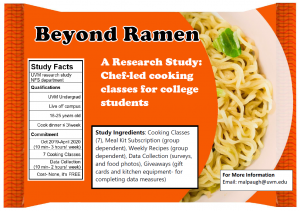Weight Loss Research
Americans are cooking fewer meals at home and eating more convenience foods prepared elsewhere. Less frequent cooking at home may be associated with increases in obesity and risk factors for chronic disease due to the generally lower quality of diets associated with prepared, ultra-processed foods. Our team examines cooking as an intervention for weight control in overweight and obese adults, and its potential for improving food agency and diet quality.
Beyond Ramen
College students may be living on their own, and, for the first time, be responsible for preparing their own meals. Compared to young adults living on a college campus, young adults who live off campus report less healthy dietary intake and less healthy home food availability. There is also great variation in the level of cooking skills college students report. Therefore, there seems to be a need to help young adults living off campus to develop a sense of food agency and cooking skills. Our team was interested in evaluating whether active cooking classes and/or the provision of meal kits would result in greater food agency, an increase in cooking frequency, and an improvement in diet quality for those involved. Participants (university students) took part in six cooking classes or received no cooking instruction. Classes were taught by a chef educator, and class recipes were designed by the chef and a team of registered dietitians. Following the cooking classes half of participants received six weeks of meal kit boxes that included recipes and ingredients for three meals
.
Publications
Alpaugh et al_2020_Cooking as a Health Behavior
Interested in learning more?
To learn more about this work, you can contact Mattie Alpaugh (malpaugh@uvm.edu)